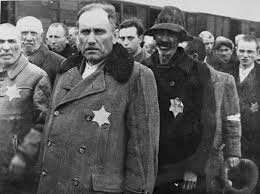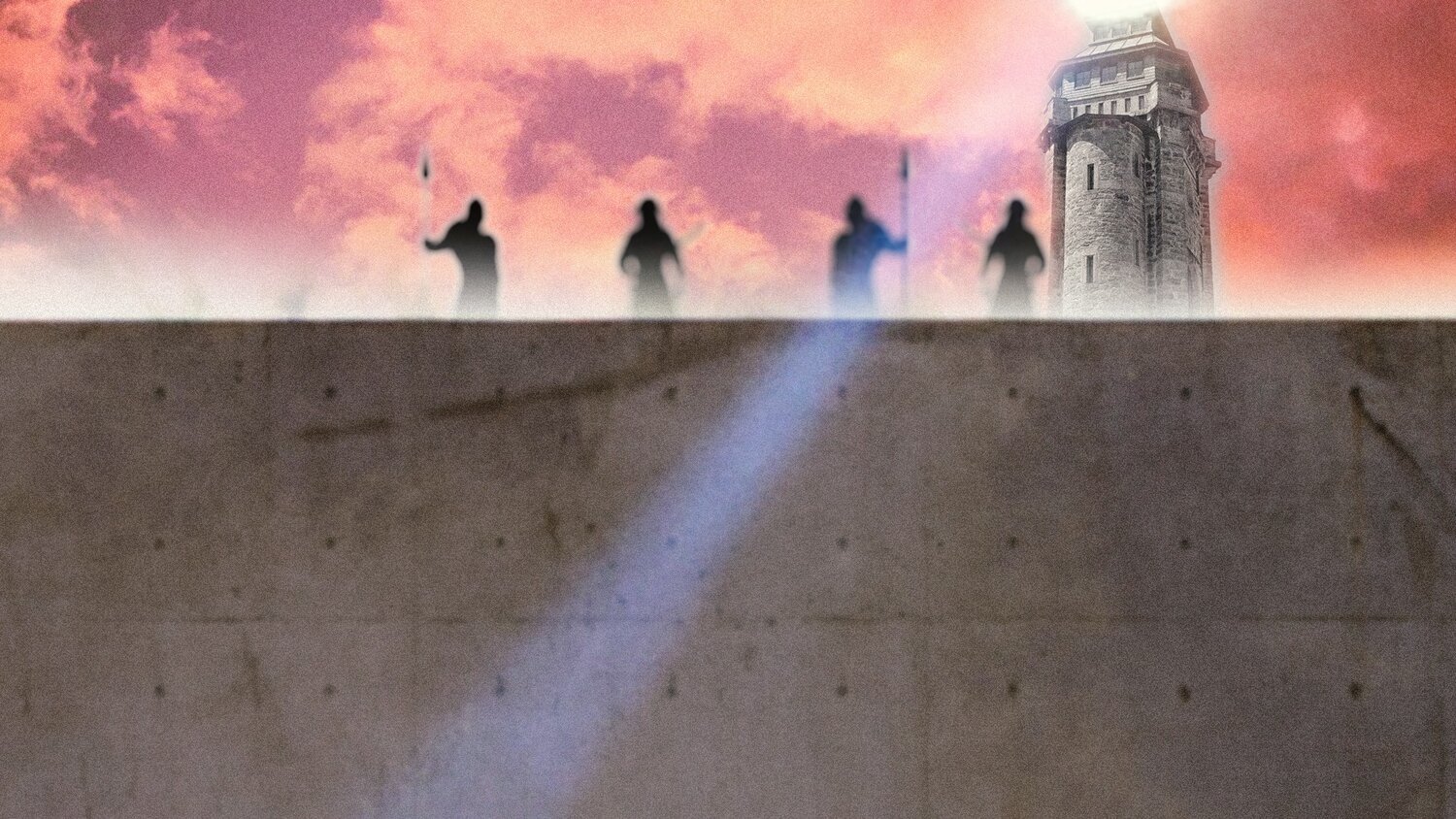Being Jewish in America: Two generations after the Holocaust
Ron's Story
Born in 1949, the year after Israel was declared a nation, my early years were painted against the backdrop of Brooklyn, NY. In fact, my whole family was from Brooklyn, starting with all my grandparents, Orthodox Jews, who immigrated from Eastern Europe through Ellis Island. I lived in Bensonhurst, not far from Coney Island. As a kid, life was good. I grew up in a very Jewish neighborhood. My public school, PS 97, was filled with mostly Jewish kids from my neighborhood. The school even closed on the Jewish High Holy Days.
As a young boy in that environment, I was shielded from the horrors of the Holocaust. So here, amidst the brownstones and delis, I lived in a Jewish community that was trying (unbeknownst to me) to heal - to breathe again.
With every Yom Kippur and Hanukkah, memories of horrors from a not-so-distant past mingled with newfound hopes. For once, the problems FOR the Jews felt distant, and the problem OF the Jews felt like a fading nightmare. Perhaps, just perhaps, history's pendulum was swinging back in favor of the chosen people.
While I was still a young kid in grade school, my family picked up and moved from New York to sunny California. I no longer lived in a predominantly Jewish neighborhood. That’s when I found out that there were some who didn’t like Jews. I was chased home from school, spit on, beaten up, and called a Christ killer. I didn’t even know WHAT that meant!
Being Jewish took on a completely different dynamic. There were people out there who didn’t like us. I began to learn more about WWII and the Holocaust from my dad. My dad was a first generation American patriot. He was a 19-year old kid who, when Pearl Harbor was attacked, walked away from a contract to pitch for the New York Yankees and enlisted in the US Navy.
Most of the dads I grew up with were WWII vets. I was fortunate to grow up surrounded by men who had done the hard thing and were an example of strong ethics, morals, and family values.
As for my grandparents, they never talked about where they came from, or their families in Eastern Europe, or what happened to them. And I never asked. It was like an unwritten law that this is something we don’t talk about.
All I knew was that our family all perished in Poland, Germany, etc., at the hands of the Nazis. As I became a teenager, I began to learn about what really happened.
It was not until my last grandparent died, my mom’s mother, that we all got a personal glimpse into the horrors of the Holocaust. My grandmother had, hidden away, a bunch of letters from her brother, whose name was Israel. He was running from the Nazis from one town to another, to another. And then the letters stopped. And we all knew at a personal level for the first time the horrors that we knew all along. They are tucked in the back of every Jewish mind. And we all knew that those people called themselves “Christians.” It took years before I came to the place of realizing that they were not remotely connected to Yeshua (Jesus), the one I now call Lord. This is the beginning of a life journey.
Matt's Story
Well, I had a Bar Mitzvah when I was 13. It was the culmination of a couple Shabbats (Saturdays) of Hebrew school and a whole lotta cirrus (chaos) surrounding “the main event.” It was the greatest Bar Mitzvah you've ever seen. The Messianic congregation in Irvine, California was filled with my friends and family.
All of them proud, as proud could be. Everyone was excited, except for me. But why?
For my Bar Mitzvah, my mentors gave me this Bible. There was no such thing as slimline Bibles back then. Everything was big and heavy. But they took special effort to get my name embossed in gold on the front along with a gold star of David.
They wrote a dedication message for my life taken from Psalm 91:11.
“For He will give His angels charge concerning you, to protect you in all your ways.”
Being 13, you can get made fun of for just about anything. I was short, dark, and handsome (still am), and the easy target was being made fun of for being Jewish. I wasn't sure why they were making fun of me, and I'm not sure my taunters knew why they were making fun of me. It was just the thing to do when you knew a Jew.
I remember coming home after a particularly grueling lunch with “friends.” I went into my room and started scratching off the star of David on the front of my Bible. I didn't want to be Jewish anymore.
But being Jewish doesn't stop when you successfully scratch the star of David off your Bible. It's like being Korean - either you are, or you aren't. Something stopped me that day, and I didn't finish the job. Somewhere in my 13-year-old head was enough sense to know, or maybe it would've been the Jewish guilt I would get from my mom. But this was more than something I was born into, this was a calling.
Growing up seeing images on Holocaust Remembrance Day would be an annual reminder of who I was. Thankfully, it was always a thing of the past. At least that’s what I thought growing up. I couldn’t imagine a hatred like that returning. We knew too much. We saw the horror, and that was for another barbaric time.
Taking our oldest son to Israel after his Bar Mitzvah, we got to show him the land of his fathers. We proclaimed with joy, “These are your people! This is your heritage! Isn’t this GREAT?”
And it was.
Walking the land of Abraham, Isaac, and Jacob with a new generation of chosen people was fantastic.
Until we got to Yad Vashem, the Holocaust Memorial in Jerusalem.
Having been many times, my wife and I decided to follow our son at his pace. It took me by surprise, as my son was voraciously reading each and every display and learning the story of the Holocaust in its unfiltered reality.
I looked over at my wife, who was silently crying as she watched our boy realize for the first time, “Noah, this is also what it means to be chosen.”
It doesn't take a genius to look around and know that being Jewish in America doesn't exactly come with perks. I'm an American, male, Jewish believer in Jesus of Nazareth. That puts me on more than a few of the world's most hated lists. It was enough to make me want to scratch off the rest of that star and just blend in.
It wasn't that long ago that Jews in Europe thought the same thing, who found themselves wearing a yellow Star of David, branded with a tattoo, both of which could not be removed. You would've thought that hatred was satiated 80 years ago, but in fact, the hunger is back.
The Shadow of October 7th
October 7, 2023. A day now branded into the collective heart of the Jewish community. On this day, Israel faced a torrent of aggression unparalleled in recent history. While the last 50 years have held their own version of violence, and solitary attacks on the streets, a bombing, or even rocket attacks - there is nothing to compare to 2,500 terrorists crossing the border in unified planning and horror to bring the face of evil upon innocent men, women, children, and even babies in Israel.
The world watched, some with compassion, others with unconcealed glee. Evil capturing every moment on Go Pros and live-streaming murder to the families of the slain in real-time. It’s sickening.
This wasn't just an attack on a nation. It was an unmasking of a dormant hatred, a reminder that the venom of anti-Semitism still courses through the veins of the world.
A nation, historically seen as a haven for the oppressed, is showing cracks in its facade.
Today, being a Jew in America feels like navigating a minefield.
The very sanctuaries of learning, our college campuses, have turned into arenas of conflict. Pro-Palestinian rallies, while championing a cause, are veering into disturbing anti-Semitic territories. Jewish students, seeking knowledge and growth, find themselves locked in libraries, with offers of attic hideaways as their only respite – chillingly reminiscent of a not-so-distant past.
And the streets? They bear witness to this rising animosity. Dissenters ruthlessly tear away posters of hostages from electrical poles, obliterating pleas and prayers for their safe return. Major cities, like Brooklyn, are seeing marches of hate: traffic halted on iconic bridges, and signs depicting Jews in trash cans with slogans like "Keep the world clean." These images, heartbreakingly, could've been pulled straight from the streets, leading to concentration camps like Bergen Belsen.
AND ALL OF THIS IN DEFENSE OF THOSE WHO COMMITTED INCREDIBLE INHUMANE ACTS TO HUMANS, THE LEAST OF THESE!
Survivors of the Holocaust shot at point blank range, or if they survived this atrocity, they await death again in a new concentration camp of an underground tunnel in Gaza. It’s sickening!
A nine-year-old from a Kibbutz has her arm cut off at the elbow, only to bleed to death, scared and alone for hours, dying just minutes after help arrived. It’s horrifying!
Or babies whose parents are already killed who are taken and thrown into an oven in their family kitchen to be burned to death, with ashes reminiscent of those who perished in the same manner. It’s atrocious!
Evil has organized again. Same enemy with the same hate infused into a new people to destroy an old people.
Sometimes, it's tempting to think: "Would it be easier to just blend in? To hide this star, this identity?" A fleeting thought, yes, but it is quickly eclipsed by the lessons of our past.
Just 80 years ago, in the heart of Europe, Jews sought that very anonymity. They yearned for acceptance, for a break from the relentless prejudice. But what met them was much more grave – a yellow star sewn onto their clothes, an indelible number tattooed onto their arms. Their identity, rather than being a source of pride, became a mark of doom.
Such blatant anti-Semitism forces a painful realization. The lessons of our past aren't just stories; they're warnings. Hiding our identity is not the answer. We must confront this darkness, understand our history, and stand resolute in our identity.
Echoes of Silence: The Church’s Struggle
In his profound book, "Letter to the American Church," Eric Metaxas paints a harrowing picture of the churches in Germany during the Holocaust. One would imagine places of worship to be sanctuaries of love, empathy, and solidarity. Instead, these institutions, built upon the teachings of the Jewish Messiah, found themselves in a moral quagmire.
A train, heavy with the weight of innocent Jewish souls bound for a concentration camp, chugged past a country church. As the train passed the church the choir was told to sing louder to drown out the screams for help from those who were crammed into box cars on their way to the concentration camp.
It’s unbelievable that rather than addressing this chilling juxtaposition, pastors urged their congregations to sing louder. To drown out the reality. To mask the horrifying symphony of despair outside with melodies of worship inside. This deliberate act of turning a deaf ear epitomized the passive complicity of many during those dark times.
German Pastor, Jobst Bittner, reflecting on this disturbing history, remorsefully acknowledges, "The sins of our fathers was that we remained silent when we should have said something."
But acknowledging past mistakes isn't where Bittner's mission ends. Determined to right the historical wrongs, he initiated the March for Life in Germany. This movement sees participants retracing the agonizing paths of World War II death marches. It's a symbolic journey, a public commitment that the Christian church in Germany remembers, repents, and resolves never to let history repeat itself.
The challenge now lies with the churches across the globe. Will they heed the lessons from their German counterparts? Or will history's echoes once again be drowned out by louder praises to the Jewish king as His biological family is done away with once more, this time with electric guitars and drums?
Standing Amidst the Gathering Storm
The story of the Jewish people, rich in faith, resilience, and defiance against all odds, has seen its fair share of dark days. And as history has shown, for Israel and the Jewish community, the night may still hold darker hours. But every epoch of darkness in their history was also marked by stories of reckless spirit and relentless hope.
Imagine the audacity of Moses, a simple man armed with nothing but his faith and an unyielding determination, challenging the might of Pharaoh in Egypt.
Picture the courage of Esther, a queen who risked her life, confronting King Ahasuerus, boldly advocating for her people.
And as we scan the modern chapters of history, we're reminded of the likes of Oscar Schindler. A man who, amidst the unspeakable horrors of the Holocaust, chose humanity over prejudice. He famously lamented, "I could have got more out. I could have got more. If I'd just... I don't know, if I'd just done something."
But what about today?
In the face of rising tides of hatred and prejudice, what is the stand of the contemporary church? Trivial debates over sanctuary temperatures, disputes over Fall Fest costumes, and ambitious drives to enhance the Sunday "campus experience" are hardly the mountains on which we should stake our banners.
We’ve lost the plot. If these have become the mainstay of religious discourse, then somewhere along the line, we've veered off course.
Isaiah 62 serves as a reminder for these times.
"For Zion's sake I will not keep silent, and for Jerusalem's sake I will not be quiet, until her righteousness goes forth as brightness, and her salvation as a burning torch." (v.1)
The prophet's commitment is clear. Until Jerusalem is restored to its rightful glory and shines brightly, he will not rest.
"The nations shall see your righteousness, and all the kings your glory, and you shall be called by a new name that the mouth of the LORD will give." (v.2)
The vindication of Jerusalem will be witnessed globally. This "new name" is symbolic of divine transformation and honor.
"You shall be a crown of beauty in the hand of the LORD, and a royal diadem in the hand of your God." (v.3)
Jerusalem's value is beyond measure, cherished and held up like a priceless jewel by God Himself.
"You shall no more be termed Forsaken, and your land shall no more be termed Desolate, but you shall be called My Delight Is in Her, and your land Married; for the LORD delights in you, and your land shall be married." (v.4)
The renaming signifies a change from desolation to being cherished. God's deep affection and commitment to His people are evident.
"For as a young man marries a young woman, so shall your sons marry you, and as the bridegroom rejoices over the bride, so shall your God rejoice over you." (v.5)
The marriage metaphor underscores the depth of the bond, reflecting joy, commitment, and a divine relationship.
"On your walls, O Jerusalem, I have set watchmen; all the day and all the night they shall never be silent. You who put the LORD in remembrance, take no rest," (v.6)
This paints a picture of constant vigilance and unyielding intercession for the well-being of Jerusalem.
"and give him no rest until he establishes Jerusalem and makes it a praise in the earth." (v.7)
Reiterating the beginning, the prophet concludes with a vow of unwavering dedication to ensure Jerusalem’s honor and prominence among nations.
It's a call to action, a summons to awake from complacency. Zion here symbolizes more than just a place - it embodies the spirit of a people, their struggles, and their aspirations. The Scripture doesn't merely ask us to speak up, but to roar against injustice, to tirelessly champion the cause of those marginalized, persecuted, and wronged.
For the modern church, this is the moment of introspection. It's a time to rediscover its purpose, align its priorities, and stand firm with those who need its voice the most. Will we heed Isaiah's call? Or will history remember us as mere bystanders, silent witnesses to the injustices of our times?
Eternal Decisions Amidst Earthly Challenges
The echoes of history reverberate with tales of bravery, sacrifice, and, unfortunately, persecution. But in the grand scheme of time, it is not how “history remembers” us that truly matters. Instead, it is how “the eyes of the Lord” perceive our actions and intentions. The final verses of Matthew 25 serve as a stark and potent reminder to the Christian church today.
The culmination of the Olivet Discourse in Matthew 25:31-46 paints a vivid scene of judgment that unfolds just outside the City of Jerusalem, in the Valley of Jehoshaphat. Here, after the Messiah's Second Coming, all surviving Gentiles of the Tribulation will stand, waiting to be separated - as a shepherd distinguishes between sheep and goats.
“When the Son of Man comes in his glory, and all the angels with him, then he will sit on his glorious throne. Before him will be gathered all the nations, and he will separate people one from another as a shepherd separates the sheep from the goats.
And he will place the sheep on his right, but the goats on the left. Then the King will say to those on his right, ‘Come, you who are blessed by my Father, inherit the kingdom prepared for you from the foundation of the world. For I was hungry and you gave me food, I was thirsty and you gave me drink, I was a stranger and you welcomed me, I was naked and you clothed me, I was sick and you visited me, I was in prison and you came to me.’
Then the righteous will answer him, saying, ‘Lord, when did we see you hungry and feed you, or thirsty and give you drink? And when did we see you a stranger and welcome you, or naked and clothe you? And when did we see you sick or in prison and visit you?’ And the King will answer them, ‘Truly, I say to you, as you did it to one of the least of these my brothers, you did it to me.’
“Then he will say to those on his left, ‘Depart from me, you cursed, into the eternal fire prepared for the devil and his angels. For I was hungry and you gave me no food, I was thirsty and you gave me no drink, I was a stranger and you did not welcome me, naked and you did not clothe me, sick and in prison and you did not visit me.’
Then they also will answer, saying, ‘Lord, when did we see you hungry or thirsty or a stranger or naked or sick or in prison, and did not minister to you?’ Then he will answer them, saying, ‘Truly, I say to you, as you did not do it to one of the least of these, you did not do it to me.’
And these will go away into eternal punishment, but the righteous into eternal life.”
Matthew 25:31-46
This judgment isn't arbitrary. It drills deep into the heart of one's stance towards God's chosen people, the Jews, during the Tribulation. Were they friends or foes? Protectors or persecutors?
The "brethren" in these passages undeniably refer to the Jewish people, as Joel 3:1-3 corroborates. Their treatment is not merely a litmus test of individual behavior, but a reflection of one's faith and belief.
“For behold, in those days and at that time, when I restore the fortunes of Judah and Jerusalem, I will gather all the nations and bring them down to the Valley of Jehoshaphat. And I will enter into judgment with them there, on behalf of my people and my heritage Israel, because they have scattered them among the nations and have divided up my land, and have cast lots for my people, and have traded a boy for a prostitute, and have sold a girl for wine and have drunk it.”
Joel 3:1-3
For the sheep, those who showed kindness, care, and pro-Semitism, it's not their actions alone that save them, but the faith that propelled those actions. They refused to side with the Antichrist's destructive agenda against the Jews. Their deeds towards the Jewish people during the Tribulation aren't just acts of charity; they're acts of faith, tangible proofs of their belief in Jesus the Messiah. These are the ones destined to walk into the Messianic Kingdom.
Contrastingly, the goats, the anti-Semites, will find themselves excluded. Their lack of compassion, their refusal to help, is emblematic of their spiritual void, their lack of faith. The somber warning is clear: their eternal fate is sealed not just by their actions, but by the disbelief underlying those actions.
It's not about merely being remembered as a supporter or adversary of the Jewish people. It's about where such a stance places us in eternity. The call to action is clear: Read Matthew 25 again. Reflect on its implications. As history marches forward, calling on the faithful, our relationship with and actions towards Israel and the Jewish people bear more weight than we can imagine.
In the end, it's a call for discernment and decision. Will we align ourselves with God's heart for His chosen people, or will we stand in opposition?
Taking the Next Step Together
Knowledge is powerful, but action taken based on that knowledge is transformative.
In a world where shifting narratives can blur our vision, standing firm on the foundation of truth becomes paramount. At the Jewish Road, we're not just bystanders; we're committed narrators, intent on sharing God's intricate story unfolding in our world.
Your church can be a beacon of this truth. If the pressing realities detailed in Matthew 25 aren’t part of the conversation in your church community, it's time to spark that dialogue. Some leaders might be unaware, while others might be unsure about how to broach such topics. We're here to bridge that gap.
Your voice can be the catalyst. If you sense this urgency, let your pastor know about us. We're equipped and eager to serve church communities, sharing with them on God's current work and how they can actively participate in His grand design.
It's a shared journey, and we're ready to walk it with you. Whether you introduce us to your pastor or would like us to reach out on your behalf, the connection is crucial. Let’s ensure that the church remains a pivotal voice in these defining times, echoing God’s heart for His people and standing in unity for His plans.
Know the truth.
Stand for the truth.
Share the truth.
Reach out to us today, and together, let's make an eternal difference.
To have Matt and Ron give updates, speak to your group, or media inquiries, on what is happening in Israel right now, contact shalom@thejewishroad.com.






